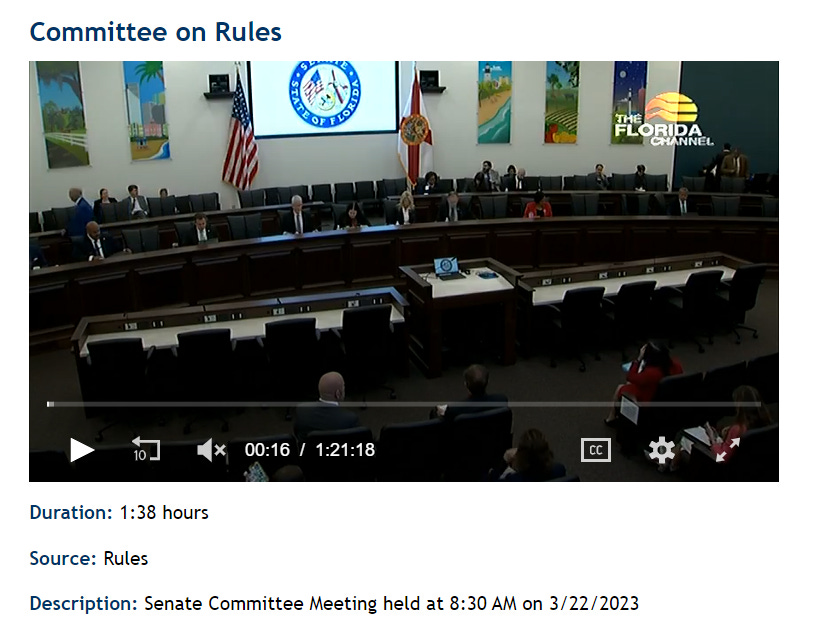Senate Committee Hearing on Capital Sentencing; DOC Notice of Proposed Rule; Gaskin Warrant Appeal
The Senate Rules Committee heard the Senate's capital sentencing bill. The DOC proposed a new rule related to information on lethal injection. Gaskin filed a Notice of Appeal in the FL Supreme Court.
It’s been a full week, and it’s only been three days so far. From yesterday:
Senate Rules Committee Hearing on the Senate’s capital sentencing bill;
Department of Corrections Notice of Proposed Rule on the confidentiality of information related to lethal injection; and
Gaskin filed a Notice of Appeal with the Florida Supreme Court.

Senate Rules Committee Hearing on Capital Sentencing Legislation
At its final stop before the floor, the Senate Rules Committee heard the Senate’s capital sentencing bill, which has now been amended—as expected based on the discussion at a hearing earlier this week.
The original post explaining the background and proposed changes in this legislation can be found here:
Amendment to the Bill
Under the Amendment, the judge can impose a sentence of death as long as at least 8 jurors vote to impose a sentence of death. However, it is within the judge’s discretion whether to follow the jury’s recommendation in each instance regardless of the jury’s vote. If the jury votes 8-4, 9-3, 10-2, 11-1, or 12-0, the judge has discretion to instead impose a sentence of life in prison without parole (LWOP).
Justifications Not Backed by Data
The discussion at the hearing was a lot of the same that we’ve heard before, including that this bill will further deter future offenders and that wrongful convictions are not as much of a threat anymore due to the advancement of science.
As we’ve discussed before, the deterrence piece is not supported by evidence. Evidence shows that murder rates are higher in death penalty states. Further, data from 2022 and 2023 thus far indicates mass shootings occur more often in death penalty states.
Similarly, the rhetoric related to exonerations is not supported by the data. Only 3 of the 30 exonerations in Florida for those who were sentenced to death were based on DNA evidence. The national rate is similar.
In a new theory that we haven’t heard before, one Senator suggested that sentencing a defendant to death ensures they will not commit further murder as opposed to a sentence of LWOP, where the defendant can proceed to commit murder in prison. Candidly, I haven’t looked into the data on this; but, I’ve never heard this before. It is true that those on death row are in single cells and do not have contact with other prisoners; however, those sentenced to LWOP have also been convicted of first-degree murder.
Changes to the Statute
There was discussion on how this bill changes the current statute. In presenting it, the sponsor, Senator Ingoglia, suggested that the only change is removing the requirement that the jury unanimously recommend a sentence of death. That’s not exactly accurate.
As I explained in the beginning of this bill’s process, the current statute requires a jury to make several findings unanimously:
That the State proved each aggravating factor beyond a reasonable doubt;
That the aggravation is sufficient for a sentence of death;
That the aggravation outweighs the mitigation; and
That death is the appropriate sentence.
This bill removes all of these findings and replaces them with requiring only that the jury find unanimously that the state proved one aggravating factor beyond a reasonable doubt.
U.S. Supreme Court Precedent
There was a lot of talk about U.S. Supreme Court (USSC) precedent and what may happen if this bill passes and then is challenged and reviewed. However, the discussion conflated a lot of discrete legal theories in a way that misrepresented the caselaw.
Sixth Amendment
The USSC’s decision in Hurst v. Florida in 2016 underlies all of this discussion. (Part II of V on the story of Hurst is coming on Friday this week. Part I is here. A brief review is here.) However, when discussing the relevant caselaw, the sponsor, Senator Ingoglia, left out the USSC’s decision and mentioned only the Florida Supreme Court’s decision on remand in Hurst v. State, which was later overturned in Poole v. State in 2020.
The USSC’s decision is the kicker here, though. The testimony from the Florida Association of Criminal Defense Lawyers (FACDL) did a good job of clarifying on this point but brought in some other cases as well, which Ingoglia suggested were merely focused on unanimity.1 Again, that’s not exactly accurate.
While there remains debate as to whether unanimity is required in the jury’s final recommendation for death and the USSC hasn’t made that ruling clear,2 the caselaw is clear that "[t]he Sixth Amendment requires a jury, not a judge, to find each fact necessary to impose a sentence of death. A jury's mere recommendation is not enough."
Based on the most recent amendment to the bill, the bill now arguably faces more constitutional issues than when it required the judge to impose a sentence of death at after a certain jury vote because the amendment makes the jury’s recommendation merely advisory and makes clear that the final sentencing determination sits with the judge. This was the USSC’s concern in Hurst v. Florida when it overturned Florida’s prior capital sentencing scheme.
Eighth Amendment
Aside from the Sixth Amendment, which guarantees capital defendants the right to jury trial, the question about unanimity is also an issue under the Eighth Amendment. There was discussion at the hearing about Alabama being the only state that does not currently require a jury’s unanimous recommendation for death. Alabama requires a jury vote of 10-2.
Under Eighth Amendment caselaw, a punishment is unconstitutionally cruel and unusual if it does not comport with the “evolving standards of decency.” Therefore, there is an argument that this new statute violates the Eighth Amendment because it is an extreme outlier compared to the other capital sentencing statutes across the country and arguably violates the “evolving standards of decency.” Note this argument and theory is completely separate from the Sixth Amendment issues that resulted from Hurst, in which the Court did not address the Eighth Amendment.
Next Steps
The Committee voted favorably on the bill with a vote of 15-4.
The next step is for the bill to be heard on the floor.
Department of Corrections Notice of Proposed Rule
Background
Section 945.10, Florida Statutes
Section 945.10, Florida Statutes (2022), sets forth a list of records held by the Department of Corrections (DOC) that are confidential and, therefore, exempt from Florida’s public records law.
Under section 945.10(4), “[t]he Department of Corrections shall adopt rules to prevent disclosure of confidential records or information to unauthorized persons.” In other words, the DOC has rulemaking authority to implement section 945.10.
2022 Amendment to Section 945.10
In 2022, the Legislature passed an amendment making additional information related to executions confidential.
Specifically, that law made the following information confidential and exempt from disclosure under Florida’s public records laws:
The reason: The Legislature found that this was a “public necessity” because disclosing this information “could jeopardize the safety of such persons or entities by exposing them to potential harassment, intimidation, or harm and could also thwart the ability of the [DOC] to obtain the necessary personnel, drugs, chemicals, supplies, or equipment necessary to carry out executions.”
The law went into effect May 12, 2022.
Notice of Proposed Rule
On Tuesday, pursuant to its authority under section 945.10, the DOC proposed a new rule to implement the 2022 amendment.
The proposed rule essentially incorporates the language above from the 2022 amendment into the existing rule in the list of exempted records:
Practically speaking, this makes it more difficult for, primarily, capital defendants seeking information related to the execution process, as well as members of the media reporting on executions and other members of the public.
Gaskin Notice of Appeal
Gaskin has filed his Notice of Appeal with the Florida Supreme Court, appealing the circuit court’s denial of his postconviction motion seeking relief from his pending death warrant. Execution is scheduled for April 12, 2023. Follow
for more.There’s a lot going on right now. Stay tuned.
Other organizations were present at the hearing both in support of and against the bill. In addition, the ACLU of Florida issued a press release opposing the bill after the hearing.
Some argue that this holding is clear based on the USSC’s recent decision in Ramos v. Louisiana, which was mentioned by FACDL at the hearing.








